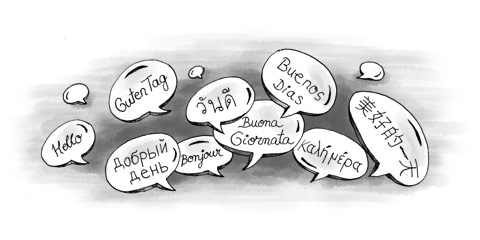For people living in Luxembourg permanently, learning the local language isn’t an option but a necessity. French, German and Luxembourgish may not be particularly easy languages to learn, but even the least linguistically-talented person can acquire a working knowledge of the language. All that’s required is a little hard work, some help and perseverance, particularly if you have only English-speaking colleagues and friends. Note that your business and social enjoyment and success in Luxembourg will be directly related to the degree to which you master French, German and/or Letzebuergesch.
If you don’t speak at least one of the local languages (French, German or Letzebuergesch) fluently, you may wish to enrol in a language course. Most people can help themselves a great deal through the use of books, tapes, videos and even computer-based language courses. However, even the latest interactive language-teaching programmes cannot answer your questions or correct your pronunciation. For most people, attending a course (combined with one or more of the other methods listed above) is likely to be the best solution. There’s certainly no shortage of possibilities. Teaching the local language to foreigners is big business in Luxembourg with classes offered by language schools (including franchises of big corporations such as Inlingua and Berlitz), local and foreign colleges and universities, private and international schools, foreign and international organisations, local associations and clubs, and private teachers.
Tuition ranges from language courses for complete beginners, through specialised business-related or cultural courses, to university-level courses leading to recognised diplomas. If you already speak one of the languages but need conversational practice, you may prefer to enrol in an art or craft course at a local institute or club (or to try to find one of the many language circles, often sponsored by expatriate clubs. You can also learn a language via a telephone language course, which is particularly practical for busy executives and those who don’t live near a language school.
There are language schools in all Luxembourg cities. Most run various classes suited to your language ability, how many hours you wish to study per week, how much money you want to spend and how quickly you want to learn. For those for whom money is no object (if you’re lucky, your employer!) there are total immersion courses where you study for up to nine hours per day, five days per week. Rates vary, so shop around.
Language classes generally fall into the following categories:
- extensive 4–10 hours per week
- intensive 15–20 “
- total immersion 20–40+ “
Fees can range from a few hundred euros per week to several thousand euros for a total immersion course. You may prefer to have private lessons, which are a quicker, although generally more expensive, method of learning a language. The main advantage of private lessons is that you learn at your own pace and aren’t held back by slow learners or left floundering in the wake of the class genius. You can advertise for a teacher in your local newspapers, on shopping centre/supermarket bulletin boards, university notice boards and through your or your spouse’s employer. Also, don’t forget to ask your friends, neighbours and colleagues if they can recommend a private teacher. Lessons cost between €15 and €50 per hour depending on the tutor’s qualifications and experience.
Another option is to find someone who wants to learn (or improve) his English and work out some kind of reciprocal arrangement. This can be an economical way of learning a new language, although it depends on your having the time (and inclination) to give ‘lessons’ as well as receive them.
You can also take advantage of the newly re-configured Luxembourg Language Centre, a facility set up by the Ministry of Education initially to support language teaching and learning in schools. The Language Centre is affiliated with the official language training institutes of the various European nations, including the Alliance française (for French), the Goethe Institut (for German) and Cambridge University’s programme in TEFL (teaching English as a foreign language). The centre offers classes in eight languages (English, French, Dutch, German, Italian, Letzebuergesch, Portuguese and Spanish) at all levels and in a variety of formats, from full-time intensive courses to evening classes held in secondary schools.
This article is an extract from Living and Working in Holland, Belgium & Luxembourg.

